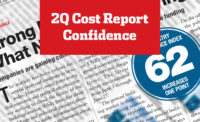Faced with economic uncertainties around the world, many global design and construction firms in the buildings sector have struggled to find a steady stream of opportunities, but some are cautiously optimistic that conditions are improving.
Skanska AB reported a 3% drop in revenue between January and September of this year, compared to the same period in 2015. “Even though a majority of our construction units are performing well, we are not satisfied with the performance in the construction stream, and we are working hard to improve the situation,” says Johan Karlström, president and CEO.
Delays in the allocation of European Union funds hampered the company’s Poland operations, leading to a rapid decline in small to medium-sized projects. As a result, Skanska staff has been reduced by more than 1,000 employees in that country this year.
|
Click Here to View ENR's 2016 Global Sourcebook |
The Brexit vote last June created market uncertainty in the United Kingdom, especially in commercial building. Skanska has been able to leverage existing relationships in U.K. to land work, recently signing a contract with Great Ormond Street Hospital to build the Zayed Centre for Research Into Rare Diseases in Children, in London. The project is the facility’s third phase of redevelopment.
Meanwhile, the company has seen continued strength in the building sectors in its home country of Sweden. In November, Skanska signed a contract with Stockholmshem to renovate six residential buildings in Stockholm.
Further, it has been able to shore up its portfolio with a steady stream of development projects. In October, Skanska announced a $66-million investment in The View, an apartment building in Nacka Strand, Sweden. The project is a 50% investment with joint-venture partner Carlyle.
David MacKenzie, COO of construction services at AECOM, says his group expects to see improved market conditions and growth in 2017. The firm was initially concerned about the potential effect of Brexit on the U.K. market, but its outlook has improved. “What we’ve seen is that it’s more of a ripple, rather than a wave,” he says. “The devaluation of the [British] pound has increased outside investment in the U.K., particularly in the residential sector. Product is so much cheaper.”
In March, AECOM secured its first major residential win as a design-build contractor in U.K., signing a contract on the first two phases of Long Street, a new $51-million high-end residential development in London. The project is being built for global development firm IGI. “That’s enabled us to build our [design-build] business there,” MacKenzie adds. “We’re looking at other commercial opportunities now. The U.K. market for the next 12 months to three years looks very good.”
AECOM continues to integrate construction services into its offerings, building off the acquisitions of Tishman Construction and Hunt Construction. MacKenzie says the firm is leveraging Hunt’s expertise in sports to pursue a stadium project in Hong Kong as part of a consortium. “That’s high on our agenda,” he adds.
Turner International sees improved conditions in some of its key markets, especially Southeast Asia. Abrar Sheriff, president and CEO of Turner International, says the company has strong prospects in Malaysia, Vietnam and Thailand. In Malaysia, Turner has established a relationship with developer Sime Darby Property to deliver several major projects in Kuala Lumpur.
Turner’s improved prospects come after the company saw many projects stalled in Asia in light of low oil prices and currency crises in countries such as Kazakhstan. Sheriff says many of those projects are moving forward again. “Everything tightened up. But in the second quarter of this year, things opened up again,” he says. “It’s almost like there was a reset in the market—it came back to life. I think, next year, it will be strong. I’m optimistic for Southeast Asia and central Asia in 2017.”



Post a comment to this article
Report Abusive Comment